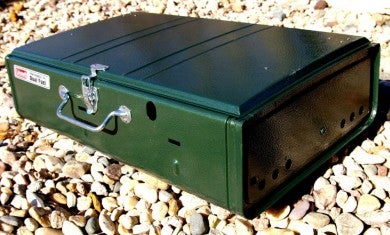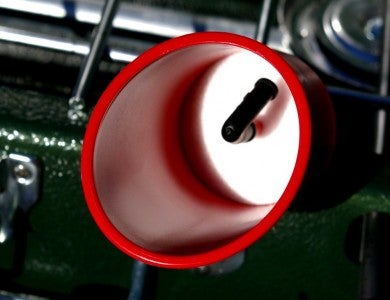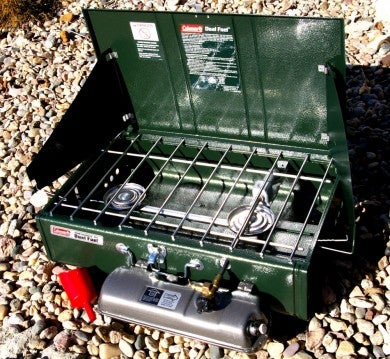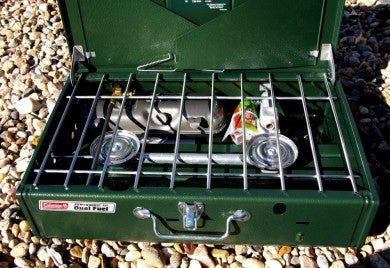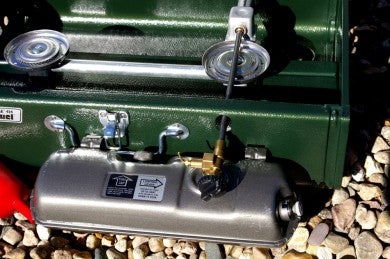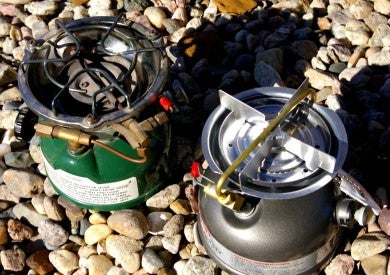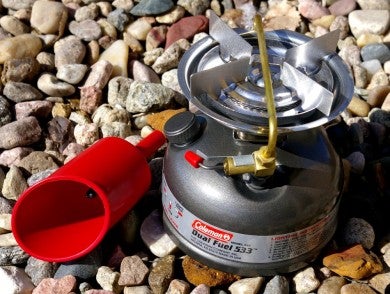Coleman Sportster and Powerhouse Dual Fuel stoves
Major Pandemic 09.12.13
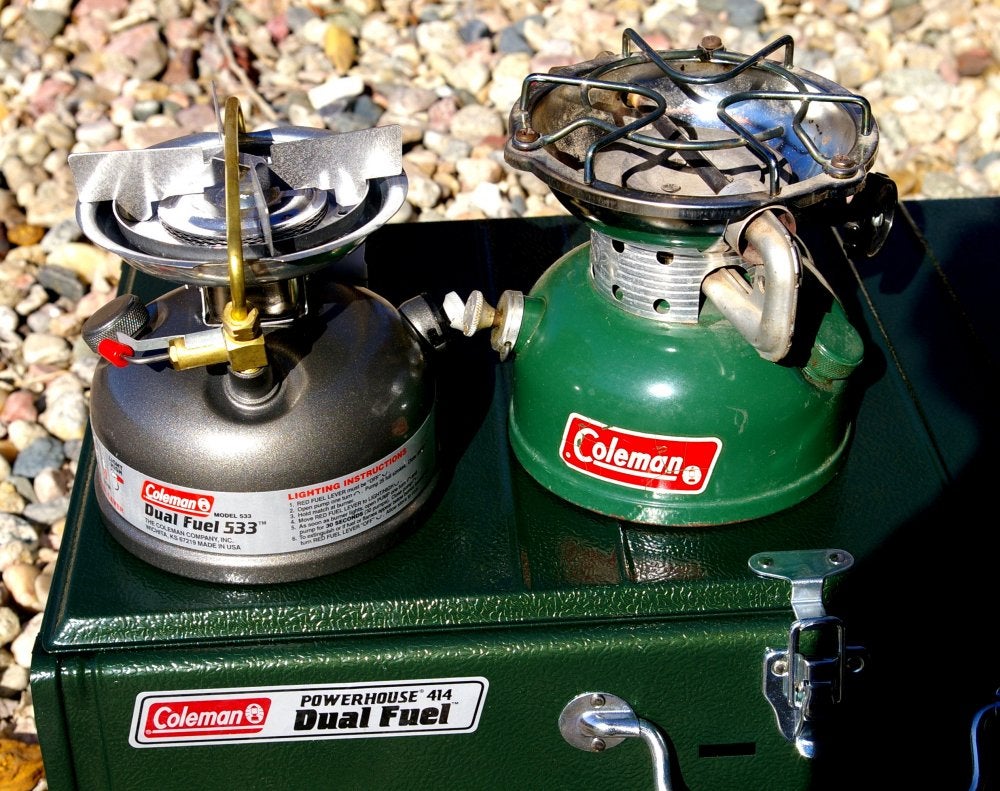
When I was growing up, Pa Pandemic apparently had an aversion to the concept of a hotel, and instead we filled the frequent KOA camper punch cards quickly as I was dragged around the country on “vacations”. During our sunny, hot, humid, cold, rainy, tornadic, and otherwise semi/non-hospitable vacations, our shelter was a large, green, eight-person army surplus tent or occasionally the car. Food was always prepped with a series of stone cold reliable Coleman stoves.
Our first Coleman was a 1940s era Dual Burner Coleman camp stove bought used at a garage sale. It looked like hell, but what I referred to as “the suitcase stove” still lit every time… that is until it was accidentally and tragically run over after using it as a tire block on a steep grade. After that defeating blow to the large Coleman stove and a very brief interlude of over the fire cooking, Ma Pandemic took the opportunity to migrate us to restaurant eating, and consequently we downsized from that great dual burner model to a new single burner Coleman 502 Sportster stove.
From my perspective, the new Coleman 502 Sportster seemed dedicated soley to making coffee in one of those old percolator pots with the glass lid handles, but it did serve more than a few meals. The small 502 stove has easily run a hundred gallons of various fuel through it and I still use it regularly 30 years later.
What impressed me most about those stoves back then was the durability. They were neglected, rained on, blown over, dropped three feet or more, thrown into the car (with force) more than a few times on hastened weather related retreats, and generally abused. They still always worked all without ever, from my memory, being cleaned.
Fit, feel, and features
The Coleman Sportster and Powerhouse are one of the few stoves left which are made of good old fashioned steel. If you find a more study stove I would be shocked. Both of the current day mdoels definitely feel substantial due to the steel.
That said they are not particularly the lightest camp stoves, but they will most likely be the only ones still working after 30 years of heirloom use. The paint finish on the new version is excellent and seems to resist abuse as well as or better than the old versions.
These Colemans have become the handiest stoves for me during power outages and a few disaster situations. They’re also a great way to cook food at camp, when tailgating, or at the range. More importantly, these stoves give you the peace of mind that no other stove can because they are Dual-Fuel. Although Coleman only recommends kerosene and unleaded, I have run the old dual burner and the 502 on everything from kerosene and unleaded, which provide the best results, to diesel fuel and high proof alcohol. As the bullet proof design has not really changed at all, I see no reason why these new 2012 versions should not run all the combustible array of liquids the old versions did. That said, the performance will always be best with kerosene.
Other fuels like alcohol, diesel, and unleaded gas will provide a cooler flame and/or odor and/or soot. In general I have found that high proof alcohol and diesel provide marginally cooler flames that add about 1-2 minutes to boil times but do run longer. Unleaded has about the same heat output, but does produce an odor.
If we are to compare the old vs the new versions, the variations are small refinements which are focused on reducing weight were it makes sense.
The old Coleman 502 Sportster is noticeably heavier than the new Sportster. Part of this weight is due to the change of a grate system to an integrated windscreen/grate which reduces a lot of weight and still provides complete support of various sized cups and pans. The gas valves are also different: where the old 502 has both a shut off and knob regulator (which personally seemed redundant to me), the new version combines the functionality into the single shut off style valve all while saving more weight and keeping costs to a minimum.
Everything on the new Powerhouse seems about the same, with the ability to fire up just the right primary 9000 BTU or both the primary and secondary 8000 BTU left burner which is activated by a butterfly valve on the left outer side of the stove. In the old model, the left burner provided about 50% more output, but on the new version it seems the outputs are very similar. Like the older model, the Coleman Powerhouse has integrated wind shields to help not only keep the flame unaffected, but also help with pan and cookware efficiency.
A simple thing that makes a huge performance and operational difference is the included filler funnel with integrated filter. No matter how careful you think you are with the fuel, you will be surprised by the garbage a simple filter catches that would interfere with the performance or operation of the stoves.
Functions
Coleman does not recommend storing fuel in the stoves, but I have always done so and never experienced any leaks after de-pressurizing the tank before storage. But this is your choice. Generally, I keep my Sportster full and ready to go and fill the large dual burner Powerhouse as needed.
The Coleman Powerhouse will run for 2.3 hours on high with both burners operating without refill, and the Sportster will run 2 hours on high. From an output spec perspective the Sportster delivers 10,500 BTU, which a bit more than the 9,0000 BTU output that one burner can deliver on the dual burner Powerhouse. With the larger tank, the Powerhouse will run considerably longer on a single burner without refueling.
The Sportster is always ready to go and requires no setup. Pull it out, place it on a stable surface, pump the integrated pump about 40 times, hold your lit Zippo next to the burner, and flip the red gas knob to light. Once it’s lit, you then then adjust as needed as the system heats and pressurizes. In theory, the regenerator tube over the burner heats and repressurizes the tank, but my experience is that if you are running for extended periods or low on fuel, you may need to give the stove a pump here and there.
The Powerhouse operationally is the same, but there is some nominal setup required as the tank is stored inside the stove when not in use. Set the Coleman Powerhouse on a stable surface, flip open the clasps and open the lid and crate to remove the tank assembly. The tank assembly mounts on the front of the stove with the fuel tube running inside over the right primary 9000 BTU burner. The suitcase sized Coleman Powerhouse may seem like a lot of wasted space, but extra points go to those that realize that those hollow cavities in the powerhouse can be filled with food and utensils once the stove is cool.
I validated Coleman’s Sportster 4 minute 1-quart water boil, and the Powerhouse did it just under 5 minutes. Happily Coleman has not surcomed to the idiocracy of putting 50 safeties on everything to protect the morons. Both stoves can be used easily and safely by any mildly intelligent individual, though the idiots will still find away to burn themselves.
Final thoughts
These multi-fuel Coleman stoves are smart common sense products which provide multi-use convenience for outdoor cooking, and they also happen to be one of the best stoves for preparedness purposes.
The key feature of these stoves is their multi-fuel capability. To achieve this flexibility some performance efficiency is given up, but that minor performance reduction does not outweigh the durability and fuel flexibility of the Coleman Powerhouse and Sportster stoves.
At least Coleman is still assembling these stoves in the US with US and foreign parts. It may be a small matter to some, but I feel it’s a big deal that labor and some manufacturing is still in the US where it should be.
Whether you need to cook up a couple pots of chili for your team or cook for your family during a power outage, these Coleman stoves are must have items for every home in the US.
Specs: Coleman Sportster II Dual Fuel 1-Burner Stove
- Boils a quart of water in 4 minutes
- Dual Fuel™ technology
- Stove burns Coleman® liquid fuel or unleaded gasoline (Fuel sold separately)
- 1.1 pint fuel capacity
- Powerful, 10,500 BTU
- Built-in pot support and wind protection
- Filter funnel includedPerfect for camping, great for emergency preparedness
- Limited 5 Year warranty
- Dimensions: 7.375″L X 7.8″W X 6.55″H
- Made in the USA of US & foreign components
Product Specifications
- Limited 5 Year warranty
- Dimensions: 7.375″L X 7.8″W X 6.55″H
- Made in the USA of US & foreign components
- MSRP $79.99
Specs: Dual Fuel Powerhouse 2-Burner Stove
- 2-burner liquid fuel stove with Dual Fuel™ technology
- Stove burns Coleman® liquid fuel or unleaded gasoline (Fuel sold separately)
- 17,000 BTU in two powerful, high performance Band-a-Blu™ burners
- Primary burner is 9,000 BTU, auxiliary burner is 8,000 BTU
- Tank capacity is 3.5 pints
- WindBlock™ system shields burners from wind for maximum heat
- WindBlock™ guards adjust for various pot sizes
- Lid stays open with or without windscreens attached to case
- Substantial cooking surface provides room for up to two 10″ size pots
- Runtime: Up to 2.3 hours on high
- Heavy duty nickel chrome grate is removable for easy cleaning
- Great for camping, picnicking, or for emergency preparedness
- Included filtering funnel for easy tank filling plus helps remove debris from fuel
- Limited 5 Year warranty
- Dimensions: 21.75″L X 13.5″W X 6″H
- Made in the USA of US & foreign components
Product Specifications
- Limited 5 Year warranty
- Dimensions: 21.75″L X 13.5″W X 6″H
- Made in the USA of US & foreign components
- MSRP $124.99
